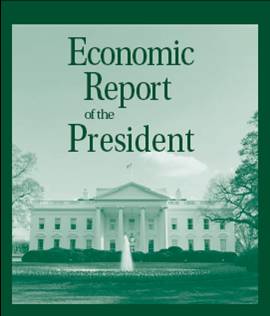Some people have the impression that financial capital zips to wherever the returns are highest. Maybe that’s the case. But I’m not sure.
Category Archives: international
Trade, Exchange Rates and Pass Through
Some thoughts on what to make of the trade and export/import price releases.
International Aspects of Tax Policy in the 2008 Economic Report of the President
The tax policy chapter of the ERP is quite interesting, in part because I have a sense of deja vu [1], [2] when reading the cross-country/international sections.
International Economics in the 2008 Economic Report of the President
Ignore the newspaper reports about the short term forecasts; that’s old news, since these White House forecasts were made in November (and hence, it’s not fair to compare these forecasts to current forecasts, as has been done in some journalistic accounts). And ignore the chapter on housing markets — there’s not going to be any discussion of how inadequate regulatory oversight (to put it mildly) might have contributed to this debacle. The interesting stuff is in the discussion — or lack of discussion — of certain international economics issues (no Renminbi!).

Economic Report of the President, 2008 [large pdf!]
Expenditure Switching or Expenditure Reduction Again: How Adjustment Is Occuring
The latest GDP release suggests trade balance adjustment is proceeding. Some of the adjustment is being driven by changes in the dollar’s value. But I think a lot seems to be coming from the reduction in consumption and income growth.
How Much Stimulus? Dollar Amounts versus Efficacy
The stimulus package seems near a done deal, and the critiques are abounding — as they should be. Greg Mankiw says no fiscal stimulus package is necessary, given the current state of the economy. Andrew Samwick says implementing a stimulus package ill conceived given that excessive deficits are what got us into this mess (a view I have some sympathy with). Jim Hamilton argues that a properly constructed fiscal stimulus is unlikely to be implemented in time, and may additionally further erode the dollar’s role as a safe haven. Paul Krugman argues that the structure of the package leaves much to be desired.
What Are the Prospects for a Two Recession Bush Presidency?
With recession calls becoming more frequent ([1], [2], [3], [4], [5]) it might pay to revisit the indicators that the NBER looks at in determining the turning points in recessions (The fact that NBER put up some new recession-dating-FAQs just a couple days ago might be a leading indicator of sorts).
International Reserves: Messages from the ASSA
I did not get a chance to go to too many sessions at the ASSA meetings in New Orleans (the AEA agenda is here). That being said, I did manage to squeeze in a few on international economics, and the topic of several papers was foreign exchange reserves.
Do We Really Know that a Flexible Exchange Rate Regime Facilitates Current Account Adjustment?
In an post in VoxEU, Shang-Jin Wei alluded to work we have undertaken examining whether de facto exchange rate regimes have an impact on current account reversion.
Financial Globalization and the US Current Account Deficit
Matthew Higgins and Thomas Klitgaard at the Federal Reserve Bank of New York discuss the outlook for financing the deficit, going forward, in a new Current Issues. From the introduction: